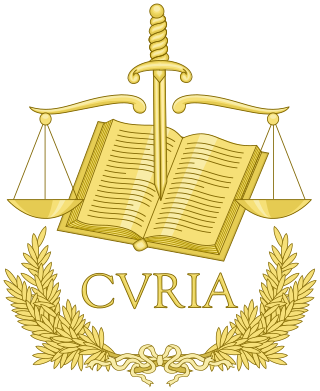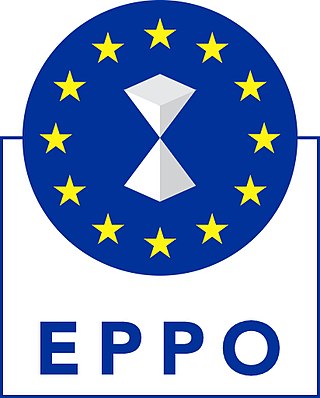Related Research Articles

The Benelux Union, also known as simply Benelux, is a politico-economic union and formal international intergovernmental cooperation of three neighboring states in western Europe: Belgium, the Netherlands, and Luxembourg. The name is a portmanteau formed from joining the first few letters of each country's name and was first used to name the customs agreement that initiated the union. It is now used more generally to refer to the geographic, economic, and cultural grouping of the three countries.

Luxembourg, officially the Grand Duchy of Luxembourg, is a small landlocked country in Western Europe. It borders Belgium to the west and north, Germany to the east, and France to the south. Its capital and most populous city, Luxembourg, is one of the four institutional seats of the European Union and the seat of several EU institutions, notably the Court of Justice of the European Union, the highest judicial authority. Luxembourg's culture, people, and languages are highly intertwined with its French and German neighbors; while Luxembourgish is legally the only national language of the Luxembourgish people, French and German are also used in administrative and judicial matters and all three are considered administrative languages of the country.
There are eight euro coin denominations, ranging from one cent to two euros. The coins first came into use in 2002. They have a common reverse, portraying a map of Europe, but each country in the eurozone has its own design on the obverse, which means that each coin has a variety of different designs in circulation at once. Four European microstates that are not members of the European Union use the euro as their currency and also have the right to mint coins with their own designs on the obverse side.

Belgium is a country in Europe and member of major international organizations like the European Union and NATO which are both headquartered in Brussels, Belgium.

The European Court of Justice, formally just the Court of Justice, is the supreme court of the European Union in matters of European Union law. As a part of the Court of Justice of the European Union, it is tasked with interpreting EU law and ensuring its uniform application across all EU member states under Article 263 of the Treaty of the Functioning of the European Union (TFEU).

The Schengen Agreement is a treaty which led to the creation of Europe's Schengen Area, in which internal border checks have largely been abolished. It was signed on 14 June 1985, near the town of Schengen, Luxembourg, by five of the ten member states of the then European Economic Community. It proposed measures intended to gradually abolish border checks at the signatories' common borders, including reduced-speed vehicle checks which allowed vehicles to cross borders without stopping, allowing residents in border areas freedom to cross borders away from fixed checkpoints, and the harmonisation of visa policies.

The euro area, commonly called eurozone (EZ), is a currency union of 20 member states of the European Union (EU) that have adopted the euro (€) as their primary currency and sole legal tender, and have thus fully implemented EMU policies.
Eurobarometer is a series of public opinion surveys conducted regularly on behalf of the European Commission and other EU Institutions since 1973. These surveys address a wide variety of topical issues relating to the European Union throughout its member states.

Europe Day is a day celebrating "peace and unity in Europe" celebrated on 5 May by the Council of Europe and on 9 May by the European Union.

The European Union (EU) has 24 official languages, of which three – English, French and German – have the higher status of "procedural" languages of the European Commission. Irish previously had the lower status of "treaty language" before being upgraded to an official and working language in 2007. However, a temporary derogation was enforced until 1 January 2022. The three procedural languages are those used in the day-to-day workings of the institutions of the EU. The designation of Irish as a "treaty language" meant that only the treaties of the European Union were translated into Irish, whereas Legal Acts of the European Union adopted under the treaties did not have to be. Luxembourgish and Turkish, which have official status in Luxembourg and Cyprus, respectively, are the only two official languages of EU member states that are not official languages of the EU.
European integration is the process of industrial, economic, political, legal, social, and cultural integration of states wholly or partially in Europe or nearby. European integration has primarily come about through the European Union and its policies.
A supranational union is a type of international organization that is empowered to directly exercise some of the powers and functions otherwise reserved to states. A supranational organization involves a greater transfer of or limitation of state sovereignty than other kinds of international organizations.
Elections in Luxembourg are held to determine the political composition of the representative institutions of the Grand Duchy of Luxembourg. Luxembourg is a liberal representative democracy, with universal suffrage guaranteed under the constitution. Elections are held regularly, and are considered to be fair and free.

The Model European Parliament (MEP) is an international simulation of the working of the European Parliament for students aged 16–19. The aim of the programme is to give young people an insight into the workings of the European Parliament and raise their awareness of European citizenship. Two sessions are held each year, each involving 180 secondary school students.

The European Public Prosecutor's Office (EPPO) is an independent body of the European Union (EU) with juridical personality, established under the Treaty of Lisbon between 22 of the 27 states of the EU following the method of enhanced cooperation. It is based in Kirchberg, Luxembourg City alongside the Court of Justice of the European Union (CJEU) and the European Court of Auditors (ECA).

Brussels (Belgium) is considered the de facto capital of the European Union, having a long history of hosting a number of principal EU institutions within its European Quarter. The EU has no official capital but Brussels hosts the official seats of the European Commission, Council of the European Union, and European Council, as well as a seat of the European Parliament. In 2013, this presence generated about €250 million and 121,000 jobs. The main rationale for Brussels being chosen as "capital the European Union" was its halfway location between France and Germany, the two countries whose rivalry played a role in starting the two World Wars and whose reconciliation paved the way for European integration.

The European Civil Service is a generic term applied to all staff serving the institutions and agencies of the European Union (EU). Although recruitment is sometimes done jointly, each institution is responsible for its own internal structures and hierarchies.

In the European Union (EU), enhanced cooperation is a procedure where a minimum of nine EU member states are allowed to establish advanced integration or cooperation in an area within EU structures but without the other members being involved. As of October 2017, this procedure is being used in the fields of the Schengen acquis, divorce law, patents, property regimes of international couples, and European Public Prosecutor and is approved for the field of a financial transaction tax.
The United States Mission to the European Union (USEU) is the diplomatic mission of the United States to the European Union; it is based in Brussels, Belgium. The US has maintained diplomatic relations with the EU and its predecessors since 1953. The first predecessor of the current mission was the US diplomatic mission to the European Coal and Steel Community in Luxembourg, which opened in 1956. In 1961, the US Mission to the European Communities was established in Brussels, which later became the United States Mission to the European Union, upon the latter's establishment in 1993.
References
- ↑ "European Commission Public Holidays 2023". European Commission. 25 May 2021. Retrieved 4 January 2023.